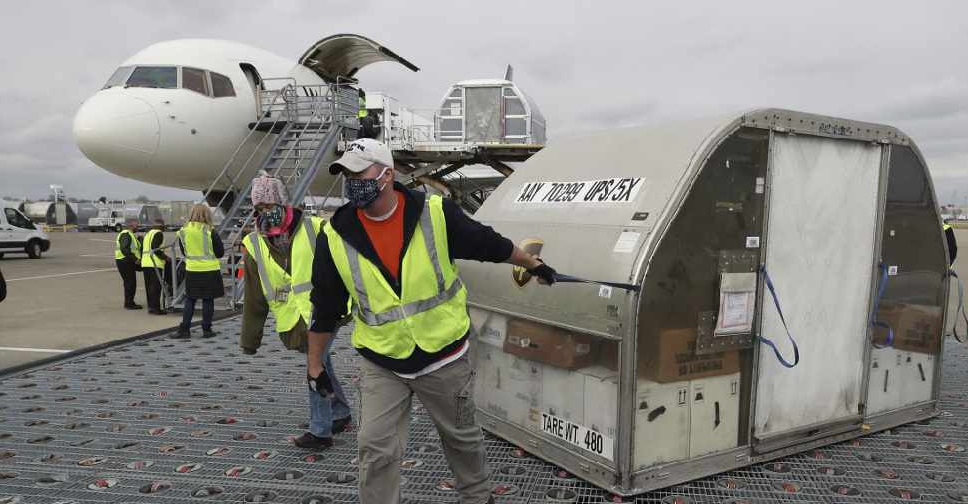
The first shipments of COVID-19 vaccine left on trucks and planes early on Sunday, kicking off a historic effort to stop a surging pandemic that is claiming more than 2,400 lives a day in the United States.
Mask-wearing workers at a Pfizer Inc factory in Michigan began packing the first shipments of the vaccine developed with German partner BioNTech SE in dry ice shortly after 6:30 am ET (1130 GMT) on Sunday.
Trucks carrying pallets of boxed, refrigerated vaccine began rolling away from the Kalamazoo facility, escorted by body armor-clad security officers. The shots then were loaded onto FedEx and United Parcel Service planes that will whisk the precious cargo across the country.
“Today, we're not hauling freight, we're delivering hope,” said Andrew Boyle, co-president of Boyle Transportation, which was hired by UPS to help ferry vaccine from the factory to a waiting plane in Lansing, Michigan.
US hospitals are preparing for the first shots to go into arms on Monday, but it will take months before most Americans can get a COVID-19 vaccine. Healthcare workers and elderly residents of long-term care homes are first in line to receive the inoculations of a two-dose regimen given about three weeks apart.
More than 100 million people, or about 30 per cent of the US population, could be immunized by the end of March, US Operation Warp Speed chief adviser Dr. Moncef Slaoui said in an interview with Fox News Sunday.
That would still leave the country far short of herd immunity that would halt virus transmission, so masks and social distancing will be needed for months to control the rampaging outbreak.
Health officials will also have to overcome widespread hesitancy about the new vaccines, with many Americans concerned the record speed at which they were developed may have compromised safety. Only 61 per cent of US respondents said they are open to getting inoculated, a Reuters/Ipsos poll showed.
"It is however critical that most of the American people decide and accept to take the vaccine," Slaoui said. "We are very concerned by the hesitancy that we see."
The massive logistical effort is further complicated by the need to transport and store the Pfizer/BioNTech vaccine at minus 70 Celsius, requiring enormous quantities of dry ice or specialised ultra-cold freezers.
Workers clapped and whistled as the first boxes headed to the trucks. The long-awaited moment comes as the US death toll was approaching 300,000 and infections and hospitalisations set daily records. Some models project that deaths could reach 500,000 before vaccines become widely available in the spring and summer.

 UK inquiry finds 'chilling' cover-up of infected blood scandal
UK inquiry finds 'chilling' cover-up of infected blood scandal
 Iranian President Raisi killed in helicopter accident, state media says
Iranian President Raisi killed in helicopter accident, state media says
 ICC prosecutor seeks arrest warrants for Israeli, Hamas leaders
ICC prosecutor seeks arrest warrants for Israeli, Hamas leaders
 Assange given permission to appeal against US extradition
Assange given permission to appeal against US extradition
 Israel intends to broaden Rafah sweep, Defence Minister tells US
Israel intends to broaden Rafah sweep, Defence Minister tells US




